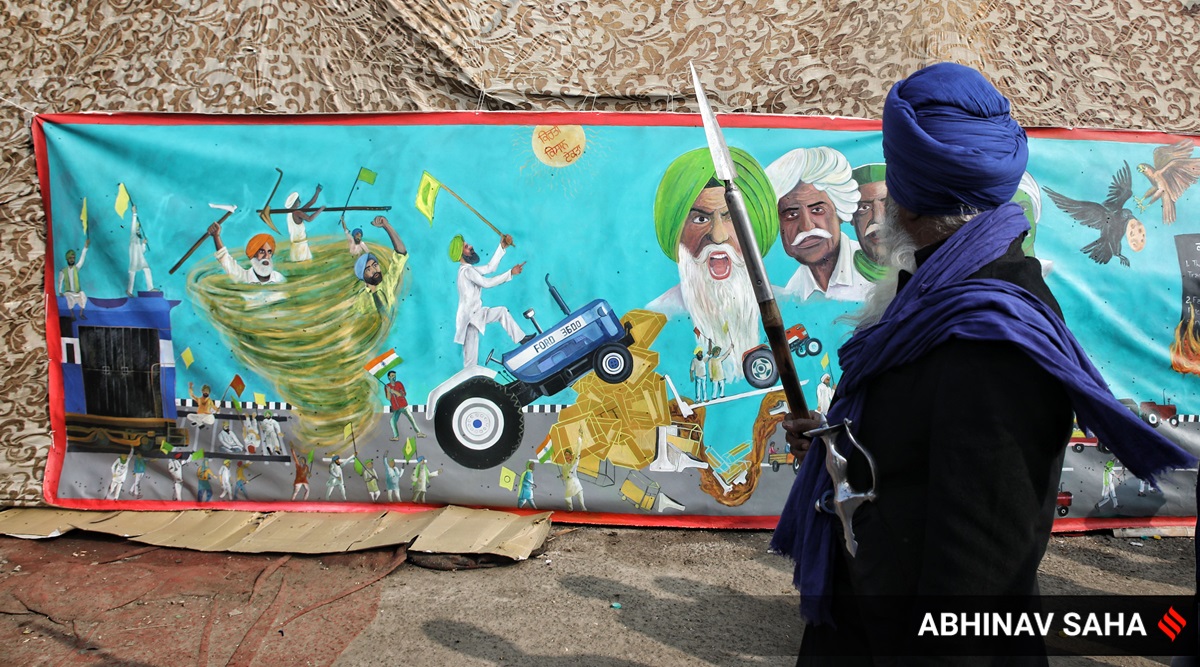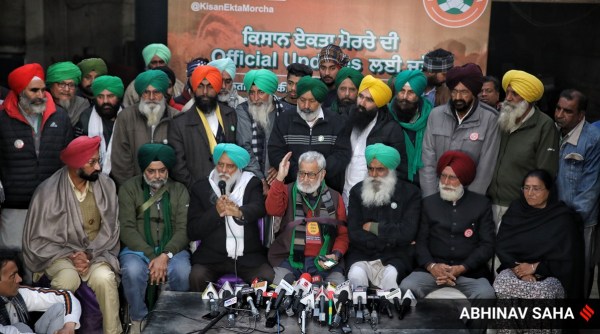 A mural at Singhu border in New Delhi, where farmers are protesting against the new farm bills, on Tuesday, January 12, 2020. (Express Photo: Abhinav Saha)
A mural at Singhu border in New Delhi, where farmers are protesting against the new farm bills, on Tuesday, January 12, 2020. (Express Photo: Abhinav Saha)Farmers’ Protest Live Updates: To mark Lohri on Wednesday, farmers protesting in the national capital will burn copies of the three farm laws. Lohri, a major festival in Punjab which marks the beginning of spring, is usually celebrated with edible items like jaggery, popcorn, rewri and sesame offered to the bonfire. Incidentally, Wednesday also marks the 50th day of the farmers’ protest in Delhi.
In other news, Haryana Deputy Chief Minister Dushyant Chautala is expected to meet Prime Minister Narendra Modi today to discuss the protests in the state over the legislations. The meeting comes a day after Dushyant and Chief Minister Manohar Lal Khattar held talks with Union Home Minister Amit Shah, after which they reiterated there was no threat to the state’s coalition government.
The Supreme Court Tuesday stayed the implementation of the three contentious farm laws and set up a four-member committee to make recommendations on the legislations after listening to all stakeholders. A bench headed by Chief Justice of India S A Bobde gave the panel two months to submit its report, which would help the court arrive at a “fair, equitable and just solution”.
The three laws are: Farmers’ Produce Trade and Commerce (Promotion and Facilitation) Act, 2020; Essential Commodities (Amendment) Act, 2020; and Farmers (Empowerment and Protection) Agreement on Price Assurance and Farm Services Act, 2020.
The SC also sought by Wednesday an affidavit from the Centre on whether a banned organisation had extended support to the agitating farmers. In court, Attorney General K K Venugopal claimed “Khalistanis” had infiltrated the ongoing farmers’ protest, and said he would file an application with intelligence inputs.
In response to the verdict, farmer unions announced they would not participate in the consultation process, and reiterated their demand for repeal of the laws. Leaders welcomed the SC’s interim measure, but said it was “not a solution”. Calling the committee members “pro government”, they said the panel was a way to divert attention from the government, “so that pressure is lifted from them”, and farmers keep fighting in the court.
 Farm leaders address a press conference at Singhu border in New Delhi after the Supreme Court judgment on the farm laws, on Tuesday, January 12, 2020. (Express Photo: Abhinav Saha)
Farm leaders address a press conference at Singhu border in New Delhi after the Supreme Court judgment on the farm laws, on Tuesday, January 12, 2020. (Express Photo: Abhinav Saha)
Even as the government called on all sides to "honour" the Supreme Court's ruling, there was a palpable sense of relief within the establishment and the ruling BJP, which were desperate to end the statemate without being seen as "anti-farmer". Sources told Harikishan Sharma and Liz Mathew the court's order was a "blessing" that "showed us a way out".
"Although the court’s move is a bit embarrassing for the government because of its aggressive position during the deadlock, this is perhaps the best way to get out of the crisis," said a senior BJP leader.
With its interim order staying the implementation of the three new farm laws, the Supreme Court has entered into uncharted territory. This is perhaps the first time the apex court has stayed a law passed by Parliament without sparing even a single hearing to examine its constitutionality — the court’s primary function. Read Apurva Vishwanath's report
To mark Lohri on Wednesday, farmers protesting in the national capital will burn copies of the three farm laws. Lohri, a major festival in Punjab which marks the beginning of spring, is usually celebrated with edible items like jaggery, popcorn, rewri and sesame offered to the bonfire.
“Farmers are preparing to celebrate Lohri tomorrow at all borders of Delhi, where they are sitting on dharna. This time, Lohri will be celebrated by burning copies of the three central farm laws. A large number of farmers from Uttar Pradesh are also joining this movement at Ghazipur border,” the Sanyukt Kisan Morcha said in a statement. Read Aranya Shankar's report
Haryana Deputy Chief Minister Dushyant Chautala will meet Prime Minister Narendra Modi Wednesday to discuss the farmers' protests in the state. The meeting comes a day after Dushyant and Chief Minister Manohar Lal Khattar met Union Home Minister Amit Shah. After the meeting, Khattar and Dushyant had reiterated there was no threat to the coalition government in the state.
The apex court’s interim order on Tuesday may be well-intentioned. But it sets a dubious precedent. One, by pronouncing not on the constitutionality of the law, but on its setting and specifically the protests against it, the court is encroaching into territory beyond its remit. Two, it is showing a clear double standard. Over the past few years, the SC has shown a marked lack of urgency and, in fact, distressing inattention to cases that have involved important constitutional questions and lined up at its door. In many cases, by delaying and by turning away, it has allowed a fait accompli, created a new fact on the ground, and in effect, wrought a denial of justice. Now, its alacrity in taking into its own hands the ongoing impasse between government and farmers on the three farm laws, and its enthusiasm in playing arbiter, therefore, raises questions. Read The Indian Express editorial
The government on Tuesday told the Supreme Court that there was a "Khalistani infiltration" into the ongoing farmers' protests in Delhi, endorsing officially for the first time a narrative that was generated on social media and later repeated by some leaders of the ruling BJP.
During the hearing on the farmers’ protests, senior advocate P S Narasimha, appearing for one of the intervenors, said groups such as the proscribed 'Sikhs for Justice' were collecting money to fund the protests. CJI Bobde referred this to Attorney General K K Venugopal and asked whether he can confirm or deny the charge. "We have been informed there is a Khalistani infiltration in the process," said AG Venugopal. The court then asked him to file an affidavit on Wednesday to confirm what he submitted, to which he agreed. Read more here
The four members of the Supreme Court panel have publicly been in favour of the farm laws and none of them has supported the demands for repealing them. Three of the four believe the protesting farmers are misguided; they are unanimous in their view that the farm laws will benefit the farmers immensely. The fourth member — Bhupinder Singh Mann — believes farmer interests should be protected and, as such, is in favour of the amendments that the government has already acceded to such as a written guarantee that MSPs would not be phased out. On the other end of the spectrum, another member — Anil Ghanwat — wants amendments which further liberalise farm trade.
There is no voice in the panel for the kind of reservations against the farm laws that the protesting farmers are raising. But between the four of them, the panel members bring several decades of experience, either as agricultural economists or farmer leaders. Read Udit Misra's report
Good morning and welcome to our live blog on the farmers' protest. Farmers have been camping at New Delhi's borders since November 26, demanding the repeal of the three farm laws that were enacted in September. Not just in the north, there are protests in some other parts of the country as well.
In an attempt to placate farmers, the central government has held eight rounds of talks with farmer unions to come to a consensus on the laws. However, these talks have remained inconclusive. With neither side backing down, farmers are planning to intensify their agitation on Republic Day, by entering the national capital in a tractor march.